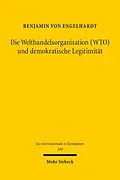The rise of globalisation has meant the demise of territorially defined states. What does this mean for democratic theory which still believes in the nation state but does not want to ignore the cross-border effects of foreign trade policy? The WTO provides an answer to this question.
The WTO has often been criticised for its lack of democratic legitimacy. Benjamin von Engelhardt offers a new perspective which starts with the general assumption that democratic legitimacy means states have to justify their actions not only to their own citizens, but to everybody else affected by them. The question then is: how can states justify national actions affecting foreigners? Federally-minded cosmopolitans would suggest the need for a global state encompassing everyone possibly affected. The WTO can be understood as an alternative solution, banning external effects while allowing regulation to remain at a national level. This approach is evident in WTO arbitration and may serve as rule of interpretation.
Autorentext
Geboren 1978; Studium der Rechtswissenschaften mit wirtschaftswissenschaftlicher Zusatzausbildung in Bayreuth, Grenoble (Maîtrise en Droit) und Freiburg; Referendariat in Berlin und New York; Dissertation an der Humboldt-Universität zu Berlin, Gastforscher an der Harvard Law School. 2009-10 im Präsidium der Leuphana Universität Lüneburg; seit 2010 Referent im Bundesministerium für Wirtschaft und Energie, 2011-15 abgeordnet an die Ständige Vertretung Deutschlands bei der EU in Brüssel.
The WTO has often been criticised for its lack of democratic legitimacy. Benjamin von Engelhardt offers a new perspective which starts with the general assumption that democratic legitimacy means states have to justify their actions not only to their own citizens, but to everybody else affected by them. The question then is: how can states justify national actions affecting foreigners? Federally-minded cosmopolitans would suggest the need for a global state encompassing everyone possibly affected. The WTO can be understood as an alternative solution, banning external effects while allowing regulation to remain at a national level. This approach is evident in WTO arbitration and may serve as rule of interpretation.
Autorentext
Geboren 1978; Studium der Rechtswissenschaften mit wirtschaftswissenschaftlicher Zusatzausbildung in Bayreuth, Grenoble (Maîtrise en Droit) und Freiburg; Referendariat in Berlin und New York; Dissertation an der Humboldt-Universität zu Berlin, Gastforscher an der Harvard Law School. 2009-10 im Präsidium der Leuphana Universität Lüneburg; seit 2010 Referent im Bundesministerium für Wirtschaft und Energie, 2011-15 abgeordnet an die Ständige Vertretung Deutschlands bei der EU in Brüssel.
Titel
Die Welthandelsorganisation (WTO) und demokratische Legitimität
Untertitel
Globale Ordnung zur Regelung wirtschaftlicher Interdependenzen und ihre Auswirkungen auf territorial organisierte Demokratie
Autor
EAN
9783161540707
ISBN
978-3-16-154070-7
Format
E-Book (pdf)
Hersteller
Herausgeber
Veröffentlichung
01.01.2016
Digitaler Kopierschutz
Adobe-DRM
Jahr
2016
Untertitel
Deutsch
Lesemotiv
Unerwartete Verzögerung
Ups, ein Fehler ist aufgetreten. Bitte versuchen Sie es später noch einmal.
